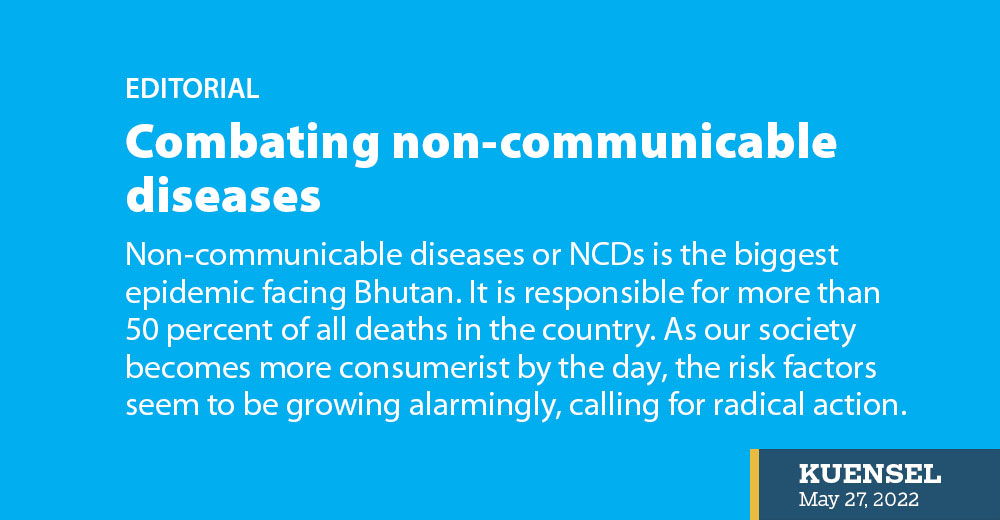Non-communicable diseases or NCDs is the biggest epidemic facing Bhutan. It is responsible for more than 50 percent of all deaths in the country. As our society becomes more consumerist by the day, the risk factors seem to be growing alarmingly, calling for radical action.
NCDs are the leading cause of death the world over. To put it in a global perspective, it is estimated that each year more than 40 million lives are lost to NCDs. Well-placed studies and reports tell us that almost 80 percent of all deaths related to NCDs occur in low- and middle-income countries. By 2025, the cost of under-investment in the fight against NCDs globally could run in the order of US$ 47 trillion.
Treatment and referral costs have seen a sharp rise in Bhutan over the years.
Hypertension, diabetes, cardiovascular diseases, cancer, alcoholic liver diseases and mental health problems have become very common today. Obesity and hypertension are among the major health problems in Bhutanese schools. According to health records, in 2020, for every 10,000 people, there were 250.9 suffering from hypertension, 82.1 from diabetes, 34.6 from alcohol liver disease, 15.9 from depression, and 19.9 from cancer.
Last year, when the health facilities across the country provided health screening, including screening for various non-communicable diseases (NCD) and assessment of mental health conditions for those above 60 years, the prevalence of NCDs among Bhutanese, as established by the results, shocked and worried us.
Our lifestyles have changed dramatically over the decade; our food habits have altered for the worst. While the number of people who consume tobacco and alcohol has increased manifold, we work physically less. We are not just talking about suja, chillies, salt and doma—we are consuming more oil-rich foods and preserved and packaged junk foods.
Interventions have not kept up with deteriorating Bhutanese lifestyles. Because NCDs are preventable, we are wasting a huge amount of precious resources which could otherwise be spent on improving our healthcare system.
But our attempts at educating the general population need to be scaled up. Today, the problem is not that we do not know—it is that we are not doing enough. Department of Public Health’s officiating director, Rixin Jamtsho, said: “NCDs in the country are increasing and we haven’t been able to eliminate the diseases as we planned to … From the Covid-19 pandemic experience, the ministry has learnt that some diseases can be eliminated if we dedicate our services as we did for the Covid-19.”
In this regard, the health ministry’s healthy refreshment sensitisation programme is much appreciated. The aim is to promote consumption of promote fruits, vegetables, legumes, nuts, yoghurt or curd and low-fat milk, among others.
However, as they say, one swallow does not a summer make. A focused and sustained effort is key to changing Bhutanese lifestyles and food habits.


